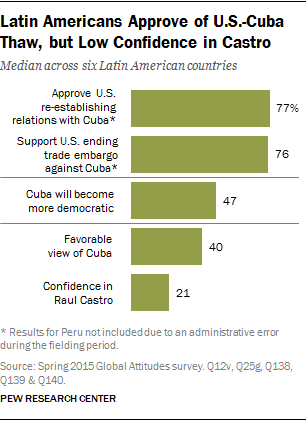 As the United States formally re-establishes diplomatic ties with Cuba, a new Pew Research Center survey shows that people in Latin American nations approve of this action and support the U.S. ending its long-standing trade embargo against the island nation. And many Latin Americans surveyed say they expect that Cuba will become more democratic over the next several years. However, overall views of Cuba across the six countries are mixed, and there is little confidence in Cuban President Raul Castro’s ability to handle international affairs.
As the United States formally re-establishes diplomatic ties with Cuba, a new Pew Research Center survey shows that people in Latin American nations approve of this action and support the U.S. ending its long-standing trade embargo against the island nation. And many Latin Americans surveyed say they expect that Cuba will become more democratic over the next several years. However, overall views of Cuba across the six countries are mixed, and there is little confidence in Cuban President Raul Castro’s ability to handle international affairs.
These are among the main findings of a new Pew Research survey, conducted in six Latin American nations (Argentina, Brazil, Chile, Mexico, Peru and Venezuela) among 6,000 respondents from April 6 to May 8, 2015. A new survey report on U.S. attitudes toward Cuba is available here.
Support in Latin America for Ending Embargo
Across the Latin American countries surveyed, there is robust approval for the U.S. re-establishing diplomatic relations with Cuba. Overall, a median of 77% across five Latin American countries share this view.1
The highest support for the U.S. restoring diplomatic ties with Cuba comes from Chile (79% approve), Argentina (78%) and Venezuela (77%). But two-thirds in Brazil and more than half in Mexico (54%) also approve of this step by the U.S. to re-establish ties, which have been severed for more than 50 years.
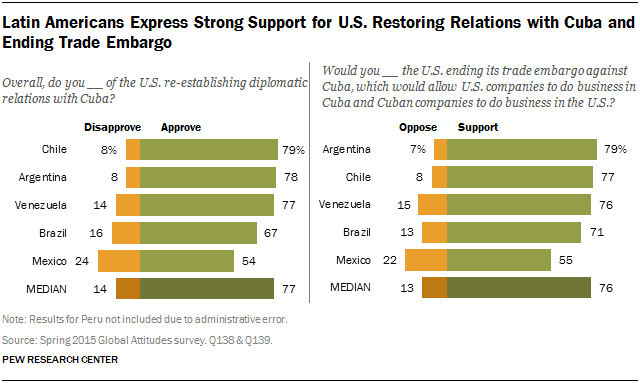
People in Latin America also strongly support the U.S. ending its trade embargo against Cuba, which U.S. President Barack Obama has pledged to do, but would need congressional approval to move forward. Overall, a median of 76% across five Latin American countries support the lifting of the embargo, while only 13% oppose such an action.
Support for the U.S. removing the embargo, as with re-establishing diplomatic ties, is strongest in Argentina (79%), Chile (77%) and Venezuela (76%). Majorities of Brazilians (71%) and Mexicans (55%) also endorse the ending of the embargo, which would allow U.S. companies to do business in Cuba and Cuban companies to seek profit in the U.S.
 Latin Americans with higher incomes2 are more supportive of ending the embargo compared with lower-income respondents. For example, 82% of high-income Argentines support the U.S. ending the trade embargo against Cuba, while only 66% of those with a lower income agree. There are also significant differences by income level in Brazil (higher-income is 10 percentage points greater), Mexico (+10) and Chile (+9) on this question. These differences associated with income also similarly extend to approval of restoration of diplomatic ties with the U.S.
Latin Americans with higher incomes2 are more supportive of ending the embargo compared with lower-income respondents. For example, 82% of high-income Argentines support the U.S. ending the trade embargo against Cuba, while only 66% of those with a lower income agree. There are also significant differences by income level in Brazil (higher-income is 10 percentage points greater), Mexico (+10) and Chile (+9) on this question. These differences associated with income also similarly extend to approval of restoration of diplomatic ties with the U.S.
Many Latin Americans Say Cuba Will Become More Democratic in Future
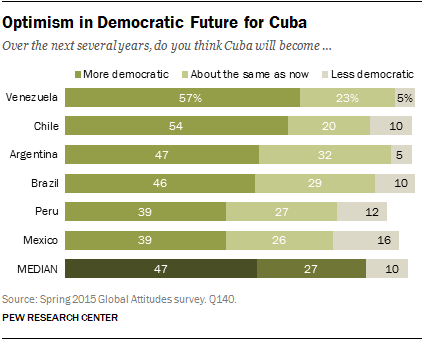 Overall, a plurality of Latin Americans surveyed say that in the next few years, they expect Cuba to become more democratic. Across the six countries, a median of 47% say this. A median of 27% say Cuba will remain about as democratic as it is now, while only one-in-ten say Cuba will be less democratic in the future.
Overall, a plurality of Latin Americans surveyed say that in the next few years, they expect Cuba to become more democratic. Across the six countries, a median of 47% say this. A median of 27% say Cuba will remain about as democratic as it is now, while only one-in-ten say Cuba will be less democratic in the future.
Venezuelans and Chileans are the most confident Cuba will become freer, while Peruvians and Mexicans express a bit more skepticism about this prospect.
Tepid Favorable Ratings for Cuba in Latin America
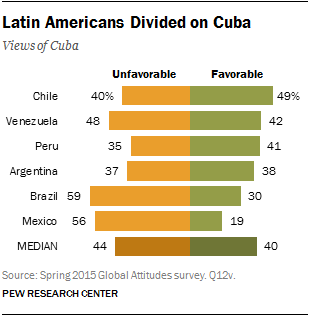 Despite clear support for an end to the U.S. embargo and re-establishment of diplomatic relations, Latin Americans are divided on their overall opinion of Cuba. Across the six countries surveyed, a median of 40% have a favorable view of the Caribbean nation, but 44% hold an unfavorable view.
Despite clear support for an end to the U.S. embargo and re-establishment of diplomatic relations, Latin Americans are divided on their overall opinion of Cuba. Across the six countries surveyed, a median of 40% have a favorable view of the Caribbean nation, but 44% hold an unfavorable view.
Overall support for Cuba is strongest in Chile, the only country where a plurality has a positive view. In Venezuela, 42% have a favorable opinion of Cuba, similar to the 37% who held this view in 2014.
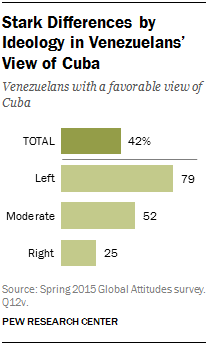 Opinions of Cuba vary sharply by ideological self-identification in Venezuela. Those Venezuelans who place themselves on the left side of the ideological spectrum are much more likely to have a favorable view of Cuba (79%) than those who place themselves on the right side of the spectrum (25%).
Opinions of Cuba vary sharply by ideological self-identification in Venezuela. Those Venezuelans who place themselves on the left side of the ideological spectrum are much more likely to have a favorable view of Cuba (79%) than those who place themselves on the right side of the spectrum (25%).
Brazilians and Mexicans are the harshest in their ratings of Cuba, with majorities in each country holding an unfavorable opinion.
Latin Americans Have Little Confidence in Raul Castro
More than half in every country surveyed have little or no confidence in Cuban President Raul Castro’s ability to handle international affairs. Overall, a median of 62% across the six countries say this, while only 21% have confidence in the Cuban leader.
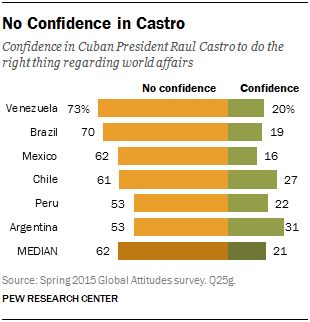 Lack of confidence is most pronounced in Venezuela (73% no confidence) and Brazil (70%). In Venezuela, those on the ideological right are far more likely to have no confidence in Castro (89%) compared with those on the left (40% no confidence vs. 57% confidence). But in no country surveyed do more than a third of the public have confidence in the younger Castro brother.
Lack of confidence is most pronounced in Venezuela (73% no confidence) and Brazil (70%). In Venezuela, those on the ideological right are far more likely to have no confidence in Castro (89%) compared with those on the left (40% no confidence vs. 57% confidence). But in no country surveyed do more than a third of the public have confidence in the younger Castro brother.
In 2007, opinion of then-leader Fidel Castro’s impact on Cuba was more mixed. When asked, all things considered, whether Fidel Castro had been good or bad for Cuba, 39% of Argentines said he had been good, while 27% thought he had been bad. Peruvians were split (38% good, 33% bad).
In contrast, 61% of Mexicans and 46% of Chileans thought the older Castro was a detriment to Cuba. Meanwhile, 66% of Americans thought Fidel was bad for the island nation.


